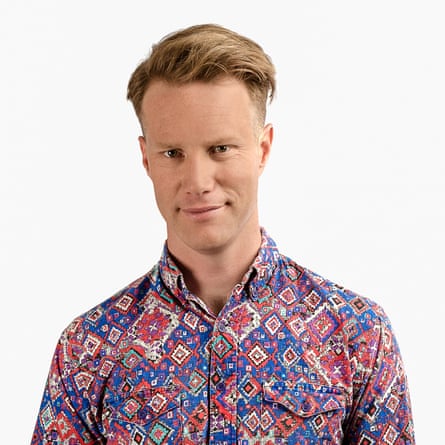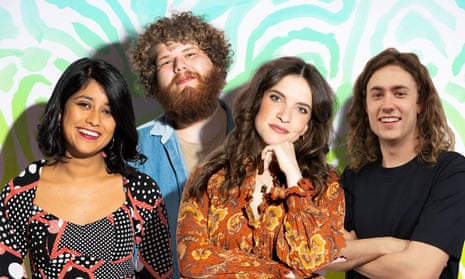Every Australian has an opinion on Triple J. The music is too obscure but also too familiar; too mainstream but not mainstream enough. The presenters are not funny, not good enough, not what they used to be.
Considered critique is healthy – especially at the national broadcaster – but as Nathan Jolly wrote last year many of the complaints often amount to this: “Isn’t it weird how Triple J lost its way as soon as I got older?”
This is what the ABC’s youth station was surely bracing for last week as it announced its most significant shake-up in years. Longtime Triple J hosts Linda Marigliano (35), Gen Fricker (30) and Tom Tilley (37) are leaving, and the 2020 roster is filled with new and rising talent. As Triple J’s content director, Ollie Wards, says: “This is a generational shift for the station.”
Lucy Smith, 25, is taking over Mornings; Avani Dias, 28, is Tilley’s successor at the news and current affairs show Hack; Bryce Mills, 25, will be the Weekend Arvos host; Dave Woodhead, 21, will host Lunch. The already announced 2020 Breakfast hosts, Sally Coleman and Erica Mallett (both in their mid-20s), are replacing Ben Harvey and Liam Stapleton to become the station’s first all-female breakfast crew.
This truly is a new era. The year Tilley started at Triple J, the youngest of these new presenters was nine.

“We target 18- to 24-year-olds,” Wards says, while acknowledging there are plenty of listeners older than that. “We’re pretty ruthless about that [and] this was an opportunity to have a presenting line-up that really represents the audience we’re talking to.”
Young Australians seem pleased – not just about the hosts but about the changes they symbolise. “I think high presenter turnover is important,” says Shaad D’Souza, a 22-year-old music writer and previously the editor of Noisey for Australia. “Triple J is youth radio after all.”
D’Souza is one of a few people who told the Guardian they are looking forward to changes at Hack. Tilley, who hosted the show for eight years, is no stranger to criticism. It came to a head after he interviewed the neo-Nazi organiser of the 2017 Charlottesville rally (a rally at which a 32-year-old counter-protester was killed). The ABC responded saying: “Hack believes it is important to hear all viewpoints.” But while the both-side-ism fits within the ABC charter, it doesn’t sit so well with many of the “OK boomer” generation who see some issues – such as the climate crisis and marriage equality – as black and white.
Of course if Triple J wants to see real generational change it may need to look further than just the presenters. “It’s almost a national pastime for people my age to moan about how poorly Triple J reflects our [music] taste,” says Joshua Martin, who’s 21 and a journalism student and music writer.
“They’re still playing artists that have been on the station since I was, like, 12 which feels strange,” D’Souza says. “When I consider music that defines this generation it’s, like, weird internet-y rap music like Playboi Carti and Tommy Genesis, not like, the Naked and Famous, and Boy & Bear ... It feels like there’s a disconnect between true Gen Z taste and the programming.”
This is a problem often laid at the feet of the group music director, Richard Kingsmill. As Martin puts it: “A man who is literally four years older than Scott Morrison [has been] the executive arbiter of cool for nearly two decades.”
Triple J staff fiercely object to that description. Responding to criticism on Twitter last week, Triple J’s assistant music director, Gemma Pike, and Good Nights host, Bridget Hustwaite, said there’s a large team that selects the music, consisting of many women and younger people. Kingsmill worked as Triple J music director from 2003-2017 but that title now belongs to Nick Findlay (in his 30s). In his new role, Kingsmill has oversight over the music on Double J, Unearthed, ABC Radio and ABC Country as well as the national youth broadcaster.
Wards says such (ongoing) critiques are “often pretty unfounded”. “I think there’s a misnomer out there that there’s one person out there that runs this stuff … Lots of people contribute to the music that we play, and that process is often not seen.” He says the ages of these people range from “20s and up”.
And the station is aimed at an “incredibly diverse” listener base which makes producing radio for everyone a challenge, he says. “We might be talking to a student in Melbourne, but also somebody driving a tractor in the bush … It’s hard to have an archetype of who the Triple J listener is. The only filter that we put on things is that [18-24] age bracket.”
The data suggests the station’s doing a decent job at hitting the demographic, although Triple J still gets a significant share of the 25-39 age group in all major cities. This, of course, is just the radio broadcast. In the latest ABC annual report Triple J recorded a 40% jump in YouTube subscribers and a 27% bump in Instagram followers. Hack’s Instagram followers grew by 62% in the past year, and Wards says: “We’re looking at putting more resources [into] content that’s online and socials.” They are important streams for young people, many of whom don’t have radios or cars.
Maddy Macquine, 23, a community manager at the not-for-profit broadcasting organisation for young people, SYN Media, says it’s “a really exciting time for Triple J”.
“Giving young people agency over their own media is important ... No one understands young people better than young people. If Triple J are ever in need of more presenters, I have a long list of talented and passionate radio makers who I can recommend, all under the age of 26.”
D’Souza would also like to offer his services to the group music director, who will continue as host of his new music show on Sunday nights: “If Richard Kingsmill needs someone to help him download TikTok on his phone, he can hit me up.”






Comments (…)
Sign in or create your Guardian account to join the discussion